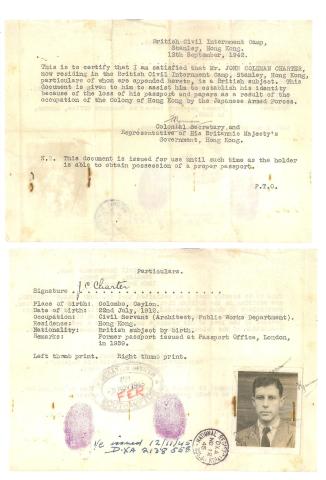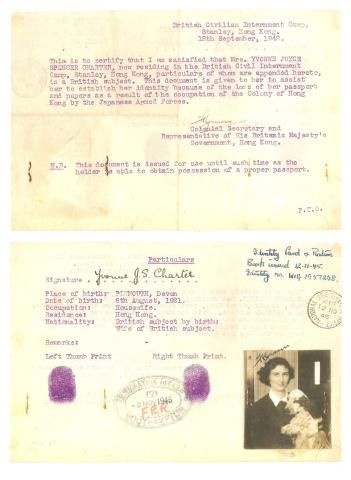Mr Lammert has already moved up from the Indian Quarters and is occupying a pantry, temporarily in one of the flats in this block. He has his meals with us. If they move out it will mean one more person will move into our room. We had thought of asking Frank Burford if he would like to leave the PWD bungalow and join us. Maudie Min does not want to leave her bungalow or she might have come. That would leave three Fortescues, two Charters and one other. If the Bidwells and Isa went it would make the balcony more commodious, for at present their beds occupy a great deal of balcony space and make it impossible to open one of the French windows. However, at the moment there is no ‘4 room’ vacant.
Today we have each been given a Red Cross correspondence form to fill in. We shall be able, (we hope) by this method to send a message:
“Not over 25 words, jaunty news of strictly personal character”.
In other words it will just enable us to inform our families or friends that we are still alive and kicking, which, after all, is all that matters. I have just completed my message and dated it 17th July 1942 (Pop’s birthday; many happy returns) which is the date by which they are to be handed in. These letters, or forms, will go via Geneva and an answer of 25 words can be appended to the back and the sheet returned to the enquirer. It would be good to get news that both our families are safe and well. At present we have no cause to think otherwise, but reassurance would be welcome. However, as I imagine it would be something like four months before we could hope for a reply, I sincerely hope we shall have moved on from here before that time has elapsed.
My message doesn’t seem vastly original but it is difficult to think of uncensorable original messages to send. I have written to Mother and Father, addressed to the Mission House, Colombo and said:
“Both still well, cheerful, regaining weight. All friends you know are well. Yvonne, twenty one August sixth, pity. Often think of families; are all safe? Love”.
By this I hope they will gather that 1. We have written before; 2. We have had a thin time but conditions have much improved. 3. That I had been hoping against hope we should be out of here for Yvonne’s 21st.
I’m afraid Yvonne is doomed to attain her womanhood as a prisoner of war in an internment camp. Although this position certainly is novel, not to say somewhat unique, I would rather we had been able to do a little more justice to the occasion. However, I must manage something: I hope the ingredients for a cake will turn up all right. I intend to melt down one of our two remaining emergency candles and turn it in to 21 little ones!
I have also chosen a spot from where I can paint a small picture of our favourite view - this, I’m afraid, will be about all I can manage for the time being for a present (apart from some chocolate I hope to be able to get). It won’t be a good picture I know, for (a) I haven’t painted anything for rather a long time (b) the paper I have at my disposal is a sheet of writing paper which is much too smooth for water colour and (c) the paints I hope to borrow are in a child’s paint box belonging to Bridget Armstrong and they will probably be somewhat dry and of inferior quality! Nothing like making excuses before hand. However, I will have a crack at it directly the sun deigns to shine for a day or two.
We have, during the last week, had the fringe of a couple of typhoons. Fortunately nothing strong or drastic developed and both my chimney pots stood up to it! Whether they will in a real typhoon remains to be seen. The mud joints of the brick stack have already begun to wash out quite considerably and, now that we have managed to procure a little cement, I am engaged on pointing the joints with weak cement mortar.
But to return to Yvonne’s 21st, we shall really have to celebrate it when we get out of here, but in the meantime do the best that internment conditions will allow. There is one thing to be grateful for at any rate, and that is that we shall both be together for it.
Adrian celebrated his 1st birthday on June 16th. The Fortescues managed to get a beautiful cake made (the American chef iced and cooked it) and there were about 16 present to celebrate the occasion. Yvonne made him a golliwog and stuffed it with some of the stuffing from our Laikoon Hotel bolster!
Over a fortnight ago we had one of the most pleasant surprises of this camp. Dinsdale, our block representative came down and told me there was a parcel for Mrs Charter. These parcels are allowed in by the Japanese: they are dispatched from Habade’s Store and must not contain more than 5 tins of food, two suits of clothes and limited numbers of underclothes, utensils etc. No person can send more than one parcel per week to an internee, though an internee may receive two or more parcels at once from different people (if they were lucky enough!). Yvonne and I were thrilled, for Isa Watson had been receiving parcels regularly, the contents of which she shared with the Bidwells (though she is very generous in the way she gives all of us tit-bits). Maudie Min had been getting parcels regularly from Sophie O’Dell (who is living in town as she has a French Passport) and here again we were lucky as Maudie is most generous; the Armstrongs were getting parcels from Mickie Hahn; and the Fortescues, though they have had only two small parcels containing things for Adrian, had managed to bring into the camp with them several hundred dollars and they had been able to buy a lot of things from the canteen. So Y and I were really the poor relations.
Our scanty amount of money had dwindled with purchases of jam, sugar and cocoa. When the Americans left Yvonne managed to sell (through B. Witham) the one remaining almost new Chinese silk, trousseau night dress that she had been hoarding. Most of her trousseau things, alas, have perished with the rest of our things at the hands of the looters and it seemed a shame not to keep this one night dress. However, we eventually decided that food and good health were more important than a night-dress (that would wear out sooner or later in any case) so she sold it and got $30 for it (one pound seventeen and sixpence (pdv £85) which represented 20 lbs of jam or 10 lbs of sugar. Sugar is terribly expensive now, about 3/9 ($3 - pdv £8.50) per lb. Y had also managed to sell a box of face powder and a bottle of eau-de-cologne for another $13.50, so with about $50 (pdv £140) in our pocket we felt relatively rich again.
Then, quite unexpectedly came the news of this parcel. We thought it might have been an unofficial welfare parcel, for a week or two earlier Dinsdale had been around taking the names of people who had received no parcels at all, the idea being that Dr Selwyn-Clarke (Director Medical Services) who is living in town and acting as medical liaison officer for the British, would try and raise funds from the few wealthy Chinese remaining and send in parcels to internees who had had nothing. (He, Mrs Selwyn-Clarke, Mickie Hahn and Sophie O’Dell have been doing simply heroic work for the internees). However, our guess at a welfare parcel was wrong, for when we went up the hill and eventually obtained it from Yamashitas’ office, we saw to our delight that it came from Yvonne Ho and Herbert Grose. I cannot say how much Yvonne and I appreciate this real kindness of theirs: we are most deeply touched and will not forget it in a hurry. Since that first parcel another one has come, a day or so ago - I do hope they are not stinting themselves, for I am told the people in town are allowed a very small amount of money and I know that prices are exorbitantly high. However, it is reassuring to this extent that if they were really on their beam ends they would not be able to send any parcels at all, so we conclude they are managing to keep their heads above water, for which we are very glad.
We have often wondered how our friends in town are faring. Hongkie, I imagine, will have managed to get away to Shanghai. We hear, incidentally that the population of HK has been reduced by 50%. On the island the number has decreased from 800,000 to about 450,000.

